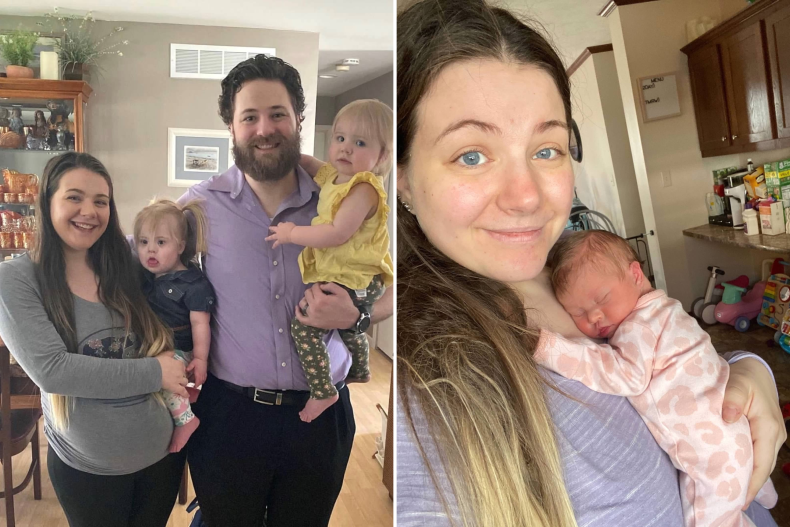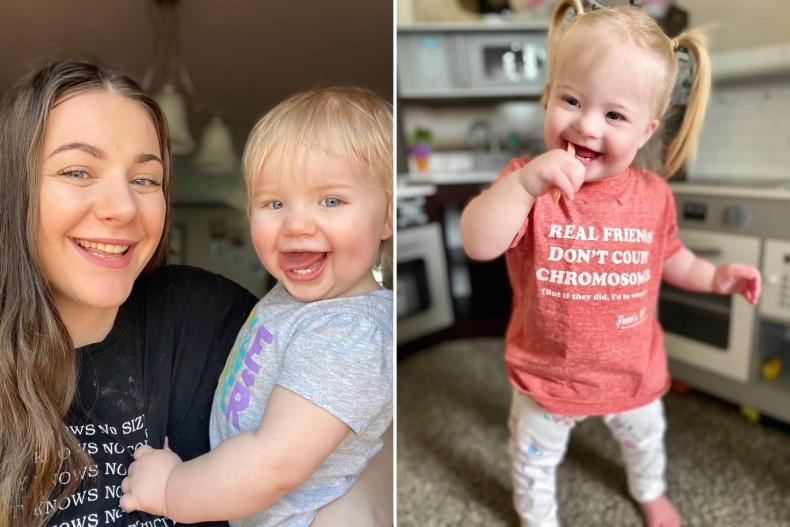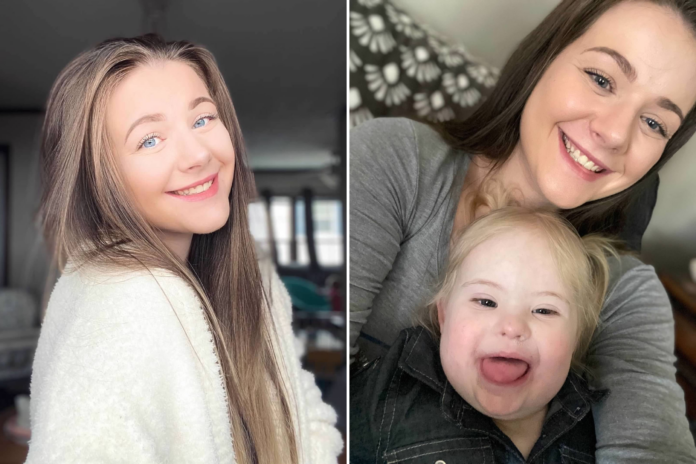At the age of 23, a mom has discovered a condition she’s lived with her entire life without realizing, and the reason why she conceived three babies with Down Syndrome.
Mom-of-three, Ashley Zambelli has experienced an inordinate amount of pain already, after suffering four miscarriages and finding out that two of her daughters have Down Syndrome. Zambelli, from Michigan, had no explanation for the miscarriages or why she conceived three babies with Down Syndrome, which is also referred to as Trisomy 21, one of which she miscarried.
The stay-at-home mom explained to Newsweek that she found out at 14 weeks pregnant that her third daughter, Katherine, had Trisomy 21, and it was “pretty rare to conceive three babies with Down Syndrome.”
@ashleyzambelli
She continued: “I have had seven pregnancies, four of which were miscarriages. One of my miscarriages was a son with Trisomy 21. We found out our first-born, Lillian, had Trisomy 21 while pregnant with her. Then fast forward to our third daughter, who we found out also had Trisomy 21 while 14 weeks pregnant.”
Zambelli was referred for genetic testing and a buccal smear test of a sample from her cheek led to a diagnosis of Mosaic Down Syndrome, as some of her cells had the usual 46 chromosomes and others had 47.
What Is Mosaic Down Syndrome?
Most babies are born with 46 chromosomes but babies with Down Syndrome have an extra copy of chromosome 21. For this reason, Down Syndrome is referred to as Trisomy 21.
The Centers for Disease Control and Prevention (CDC) estimates that 95 percent of people with Down Syndrome have Trisomy 21, however there are two other types which occur less frequently. Translocation Down Syndrome occurs in around three percent of cases, occurring when an extra part of chromosome 21 is attached to another chromosome.
The third type is Mosaic Down Syndrome, affecting two percent of people with Down Syndrome. This means that some cells have three copies of chromosome 21, and others have two copies. The CDC notes that children born with Mosaic Down Syndrome might have fewer physical attributes of the condition because some of their cells have a typical number of chromosomes.
Signs and symptoms of Down Syndrome include a lower IQ, small ears, shortness, a flatter face, hearing loss, heart defects, sleep apnea and visual impairments.

@ashleyzambelli
Dr. Xiao-Fei Kong is an expert who has studied Down Syndrome extensively and now works at UT Southwestern Medical Center. Having worked with Down Syndrome patients for more than 10 years, Kong told Newsweek he’s “only seen a few patients” with Mosaic Down Syndrome, because of its rarity.
Kong said: “People with Down Syndrome have three copies of chromosome 21 in all their cells, but those with Mosaic Down Syndrome carry an additional copy in only some cells.
“It is unusual for an adult to be diagnosed with Mosaic Down Syndrome as the condition is more commonly discovered during pregnancy, through genetic testing.”
While certain prenatal testing can uncover Mosaic Down Syndrome, Kong adds that if the correct approach isn’t taken, “the condition could go undiagnosed or misdiagnosed.”
“Although the diagnosis of Mosaic Down Syndrome sounds scary, many people with this condition have fulfilling lives. Nevertheless, additional considerations may be required in their education, family planning and disease screening. I hope that we can foster increase social support for this group.”
‘Had I Never Had Kids, I Would Have Never Known”
Although Zambelli can now see the effects of the condition on her, she admits that she had no idea that she had Mosaic Down Syndrome until her diagnosis on February 17, 2023.
“While this syndrome has many conditions associated with it, it affects everyone differently,” she told Newsweek. “For me personally, I have temperature dysregulation, patellar dislocations, pelvic congestion disorder, comprehensive difficulties when I was a child, sensory issues and small ears.
“Had I never had kids, I would have never known about my genetic condition. Outside of myself and two of my daughters, no one else in my family has Down Syndrome as far as I know.”

@ashleyzambelli
The diagnosis came as a complete shock to Zambelli, who was 28 weeks pregnant at the time, but she hasn’t let it change the way she views herself. She’s utilized her surprise by sharing her experience with social media users instead.
“My diagnosis hasn’t changed much about how I view myself or how I live my life, though it brought me to spread more awareness on Down Syndrome,” she said. “I’ve always been an open book and love sharing my life experiences online.
“I have noticed that people aren’t afraid to show their true colors after finding out about my diagnosis, needless to say, some of which aren’t pretty. Even people in my own community have asked me for proof of my diagnosis because they don’t think I look Down Syndrome enough.
“Society has stereotyped Down Syndrome into something that it’s not.”
After Zambelli shared her diagnosis story on TikTok (@ashleyzambelli) in February, her video has been viewed more than 6.5 million times, and received over 272,000 likes.
Among the 1,300 comments on the video, one person wrote: “That must have been such a shock, but also such a relief to have some answers. I don’t think I’ve ever heard of this diagnosis as an adult.”
Another comment reads: “I wonder how many people have this without ever finding out for their whole lives.”
Is there a health issue that’s worrying you? Let us know via [email protected]. We can ask experts for advice, and your story could be featured on Newsweek.


